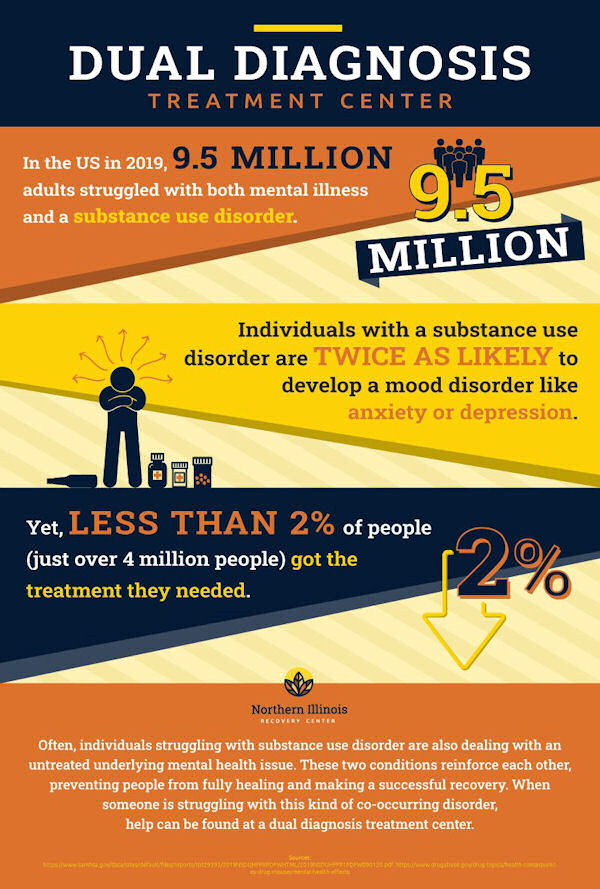If you or someone you know is battling a substance abuse problem, finding out how to take the first steps toward recovery and sobriety can be very difficult. Trying to quit using drugs or alcohol while dealing with a co-occurring mental health disorder is especially challenging. This leads to needing a dual diagnosis treatment program.
Mental health disorders and addiction commonly occur together, making treatment slightly more complicated. Fortunately, with the help of a dual diagnosis treatment program, both conditions can improve. This can help to increase the likelihood of long-term recovery.
Our dual diagnosis treatment center is located 45 miles from Chicago and provides a full continuum of care in the Midwest. Northern Illinois Recovery Center in Crystal Lake, Illinois offers dual diagnosis treatment for people with addiction and co-occurring mental illness. Learn we can support you and your loved ones throughout the recovery process.
Common Mental Health Disorders That Co-Occur With Addiction
- Depression and Substance Abuse
- Schizophrenia and Addiction
- Bipolar Disorder and Substance Abuse
- Anxiety Disorders and Addiction
- ADHD and Substance Abuse
- Post-Traumatic Stress Disorder (PTSD) and Addiction
- Borderline Personality Disorder and Addiction
- Gambling Addiction
- Personality Disorders and Addiction
- Eating Disorders and Addiction
Causes of Dual Diagnosis
- Poor self-image
- Long-term substance abuse
- Growing up in impoverished conditions
- Genetic history of mental health disorders
- Exposure to drugs, alcohol, or other toxic materials in the womb
- Gender (men are statistically more likely to suffer from co-occurring conditions)

Internal Genetic Conditions for Dual Diagnosis
Some studies state that individual genes and gene networks appear to function differently in individuals who suffer from addiction, than those who do not. Also, prenatal exposure to drugs, alcohol, or other toxins can contribute to co-occurring disorders later in life.
Environmental Conditions for Dual Diagnosis
Growing up in difficult financial situations also makes it more likely for a person to suffer from co-occurring disorders. There may even be a close relationship between poverty, mental illness, and addiction in many cases.
What is the Difference Between a Dual Diagnosis and Co-Occurring Disorder?

Which Co-Occurring Disorder Develops First?
Addiction can also lead to a mental health condition, especially if addiction remains undiagnosed or untreated. Long-term alcohol and drug abuse can cause mental health disorders. For example, extended alcohol abuse can cause anxiety and depression. To alleviate the symptoms related to depression and anxiety, someone will continue to misuse drugs and alcohol. This cycle of substance use only exacerbates symptoms making mental health and substance abuse treatment centers more necessary.

How Do You Deal With Dual Diagnosis?
Many people with co-occurring conditions believe that they can only get treatment for one issue or the other. However, if someone only seeks treatment for one condition, they increase the likelihood of relapse. If they only seek treatment for the mental health condition, their continued substance use may lead to other mental illnesses. Alternatively, the symptoms of their original disease may get worse.
That said, if they only seek treatment for substance abuse, they do not have the tools to manage their mental health symptoms. Without these tools, they may return to using drugs or alcohol. Returning to drug or alcohol use is incredibly risky because if they start using substances at the rates they formerly used, they risk an overdose.

Advantages of Dual Diagnosis Treatment Programs
Mental health disorders can include anxiety disorders, depression, mood disorders, personality disorders, and trauma. Nearly 8 million adults struggle with a mental health disorder and an addiction in the United States, making substance use disorder and mental health rehab essential if you are struggling with co-occurring disorders.
During active addiction, it is common to neglect one’s medical physical, and mental health needs. Even if you are taking medication for a mental illness as prescribed, drugs and alcohol can lessen their effectiveness and worsen your symptoms. A dual diagnosis program specializes in diagnosing and treating both substance abuse and mental health issues. They can help you manage both conditions during and after treatment.
Treatment Options for Those With Co-Occurring Disorders
Residential treatment is a comprehensive care program that generally lasts between 28 and 90 days. Throughout this period, you will live at our facility and benefit from ongoing behavioral healthcare provided by our experienced staff. Alongside individual therapy, group therapy, and a range of counseling sessions, you will also have the chance to participate in holistic treatment alternatives.
Once people have completed our other treatment services, we recommend they attend an outpatient program to receive continued support. Unlike residential treatment, an outpatient facility allows patients to receive the benefits of treatment once or twice a week to ensure that they have the tools they need to stay sober without intensive treatment.
Sometimes, a person doesn’t have the time or resources necessary to attend a residential treatment center. Fortunately, a partial hospitalization program offers the next best thing for individuals requiring outpatient treatment. Also known as day treatment programs, people attend a PHP during the day and return home at night as outpatient treatment does not require someone to live at the rehab facility as those in residential inpatient treatment programs do.
As patients move through our treatment programs, they often find that they don’t need the extensive treatment that our PHP offers. Fortunately, intensive outpatient programs allow patients to attend treatment a few days a week. During the rest of the time, the patient can return home to put the strategies they learned in intensive outpatient treatment into practice in the real world.
Common therapy and combined treatment options offered at our dual diagnosis treatment center include:
- Cognitive behavioral therapy (CBT)
- Dialectical behavior therapy (DBT)
- Individual therapy
- Group therapy
- Family therapy
Individual therapy sessions take place in a one-on-one setting. Group therapy is unlike individual therapy in that the sessions take place in a group setting. Family therapy sessions involve the recovering individual and their family members. While these and other evidence-based therapies differ in method and setting, they can all be beneficial in addressing dual diagnoses.
An essential benefit of a dual diagnosis treatment program is that you can get immediate access to a psychiatrist instead of having to wait for an outpatient appointment. Our treatment team is also well-versed in recognizing and treating mental health symptoms that typically worsen during detox.
Your treatment plan may also involve the following services:
- Medication-assisted treatment
- Medication management
- Evaluation and diagnosis of mental health disorders
- Assertive community therapy that helps you connect to community-based supports
- Access to a psychiatrist
- Sober living
- Aftercare program
To learn whether our treatment options will work for you, please reach out to our Illinois rehab facility today.
Dual Diagnosis Model of Treatment
Our dual diagnosis evidence-based treatment program in Crystal Lake, IL offers access to medical and mental health professionals. These experts can help you manage your mental disorder while addressing your alcohol and drug abuse issues.

Receive Treatment for Co-Occurring Disorders Today
If you are struggling with a dual diagnosis, it can be difficult to find dual diagnosis treatment centers that offer personalized treatment for both mental health and substance use disorder therapy services. It is crucial to find a drug rehab in Illinois that specializes in treating patients with dual diagnoses, so you can have adequate support in managing your mental health. Our rehab center treats co-occurring disorders in adults and young adults such as bipolar disorder and substance abuse, depression, and substance abuse.
When you detox from drugs and alcohol, your body and mind have to learn how to adjust, which can cause your physical and mental health symptoms to decrease. Northern Illinois Recovery Center dual diagnosis treatment center is here to support you throughout your recovery. Contact us today to get started!




